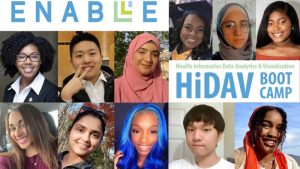Virtual HiDAV boot camp helps participants see real opportunities in health informatics
As an aspiring physician and biology major at North Carolina Agricultural and Technical State University, Kailyn Sellers never envisioned herself coding, text mining, or conducting large scale data analysis, activities she associated more with computer science than with medicine.
At this summer’s Health Informatics Data Analytics and Visualization (HiDAV) boot camp, Sellers and other participants became acquainted with many of the tools and techniques used by biomedical health informatics (BMHI) professionals, all while developing their leadership skills and discovering the variety of career opportunities in the BMHI field.
“It’s really interesting and I’m glad I learned that I can do stuff like that,” Sellers said. “This has shown me how using statistics and identifying trends can help improve patient outcomes and can be applied to many contexts like equity and scientific discovery. I feel that maybe in the future, I’ll be able to look at trends in my patients, document them, and offer better diagnoses.”
The HiDAV boot camp is a seven-week program administered by ENABLE, an initiative launched by the Carolina Health Informatics Program (CHIP) and supported by the United Health Foundation, National Institutes of Health, and the UNC Program for Precision Medicine in Health Care).
ENABLE has two components, the boot camp and an online master’s degree program. CHIP Director and Professor Javed Mostafa spearheaded the development of ENABLE and continues to lead the project, which seeks to expand access to careers in BMHI, particularly for students and professionals from backgrounds that are underrepresented in science and technology fields.
ENABLE hosted two successful HiDAV boot camps on the University of North Carolina at Chapel Hill campus during the summers of 2018 and 2019. The 2020 boot camp was cancelled due to the pandemic, though ENABLE created an introduction to data science online training module to help further its educational outreach.
The HiDAV boot camp returned for summer 2021 in an online format, retaining many of the in-person program’s most popular components, including student-directed research projects and guest lectures by industry experts, as well as virtual field trips to the National Institute of Environmental Health Sciences, SAS, Optum United Health Group 701i, and RENCI.
“I really enjoyed our guest lectures,” said Sam Song, a biology major at Carolina. “They were about a variety of topics and professions in the health care field. It was very expansive – med school, nursing, bioinformatics, statistics – just all sorts of options. We had experts talking to us about how we can get started in these fields, what’s great about working in them, and potential career opportunities. For me, as a college freshman, it’s been great to help me get a grasp of what I can really do with my future.”
The 11 boot camp participants divided into three groups for their final research projects, which examined why breast cancer mortality rates have stagnated instead of decreasing, how people reacted to the pandemic on social media in relation to other global events, and which risk factors corelate with the occurrence of strokes.
Although this year’s camp was virtual, participants said they made real connections. Besan Khader, a chemistry major from NC A&T, said she especially appreciated getting to know Program Coordinator Shikha Yadav and instructors Sree Sathya Deepthi Dintyala and Mika Wang.
“Whenever I asked them a question, even if it was outside the scope of the program, they were really helpful,” Khader said.
Gargi Dixit, a rising sophomore at Carolina, said she greatly enjoyed interacting with the other participants.
“We had social activities every Friday and also worked in small groups on our research projects, so it’s been really fun getting to know our cohort members in a really close way because we work together so much.”

